At the Battle of Dettingen in Germany in 1743, one John Ranby was the last man to perform this duty when he accompanied King George II into battle.
In 1461, William Hobbes was the first person to be appointed to this position, and Hobbes proved to be one of the few trusted servants of the House of York. Hobbes was born in London to a father who also practiced in medicine. John Hobbes sent his son to study in Oxford, and it was there, in 1459, that he trained as a Bachelor of Medicine, and after completing three years training he moved to Cambridge to practice as a doctor.
more mundane tasks of bandaging and cleaning wounds and then moving onto minor and major surgery. The role of royal surgeon meant that he followed his king into battle and dealt with a range of injuries that might have been inflicted. His
other duties would be administering to the king on a regular basis and interestingly, checking applicants who were to be
touched by the king for what was called the 'Kings Evil' or Scrofula, the swelling of the lymph nodes in the neck caused by tuberculosis. The Sergeant Surgeon would also have had the job of witnessing the torture of prisoners, they were responsible for making sure that the torture was
"not so prolonged that it endangered the prisoners life."
Within a month of Edward IV claiming the throne Hobbes was reaping in the benefits. He received 'a place, wharf, crane and diverse houses' to the value of £14 from the king as well as being paid a yearly sum of just over £26 pounds for his duties of 'principal surgeon of the royal body.' In 1473 Edward granted him an exemption from that years Act of Resumption, calling him
‘our trusty and well-beloved servant, William Hobbys, cirurgion for oure body’
It seems that William Hobbes, in his medical capacity, had no contact with Edward's sons, we know that Edward, the older boy was thought to be sick, but he was attended by the more famous John Argentine, also a Cambridge scholar. In 1475 Hobbes accompanied Edward to France, where in the August Edward negotiated the Treaty of Picquigny, and in 1479 he was appointed, along with one Walter Bate, as Master of St. Mary of Bethlehem, a lunatic asylum in London, that today we know as Bedlam.
Another of the duties of the sergeant surgeon was to embalm the body of the king, no doubt this was not on his mind when he accompanied Richard, Duke of Gloucester to Scotland in the August of 1482, but by the following April, William Hobbes did find himself performing this task on the body of Edward IV.
Dr Lund describes the ritual Hobbes had to follow from an account dated 1483.
"at the death and buryall of an annoynted king" Dr Lund explains that the body has been washed and dressed and
laid out on a board covered with gold cloth "and so shewid to his nobles by the space of ij (2) days and more if the weather it be suffre, when he may not goodly lenger endure, thake hym away, and bowel hym and then efstone
bame (embalm) him" and the body placed in a lead coffin.
Dr Lund goes on to state that in Edwards case
"first the corps was laide upon a burdle (board), all naked saving he
was covered from the navyll to the kneys, and so laie x (10) or xij (12) Ours' to be viewed.
Following Edward IV's death, Hobbes became physician to Richard, Duke of Gloucester. In this capacity Hobbes would have dealt directly with Richard's body. One of his tasks was to manipulate joints, and we can only wonder if the vast increase to his wage from £26 to £40 a year, was the reward for managing the kings scoliosis successfully. William Hobbes retained this post throughout Richards short reign, but the kings death at Bosworth in 1485 saw the end of his career.
On the 27th September 1488, William Hobbes died a loyal servant to the House of York. He was buried at Holy Trinity Priory, Aldgate, London.
Hic jacet Willelmus Hobbes quondam medicus et Sirurgicus Illustrissimi domine ducis Eboracencis ac filiorum suorum
regum Illustrissimorum Edward iiiji et Ricardi tercii quorum anime et animabus propicietur Deus amen
"Here lies William Hobbes, once physician and surgeon of the most noble kings Edward IV and Richard III, to whose soul,
and to whose souls, may God be merciful, Amen"



 RSS Feed
RSS Feed
